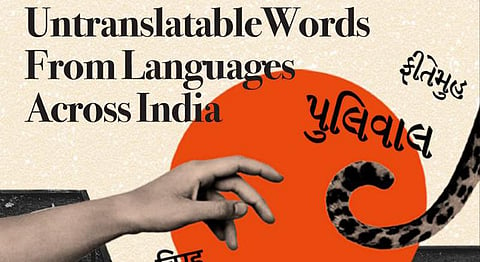
- HOMEGROWN WORLD
- #HGCREATORS
- #HGEXPLORE
- #HGVOICES
- #HGSHOP
- CAREERS
- ABOUT US
- CONTACT US

There are over 7000 different languages across the world, each with their own unique words to capture a feeling or an emotion specific to that culture. There is so much that gets lost in translation; so many nuances that cannot be captured. The beauty of language lies in its ability to capture the essence of a phrase or feeling; where a direct translation just doesn’t cut it. Thus in every language that exists there will undeniably be words that cannot be translated.
Having previously written about untranslatable Urdu words and visual representations of untranslatable words from Indian languages, in a recurring series of untranslatable words, we have curated some more untranslatable words from languages across India.
Untranslatable Words From The Hindi Language:
I. Fatafat
While it loosely translates to ‘quickly’ or ‘at once’ the English translation just doesn’t do it justice when it comes to the urgency this word commands.
II. Jazba
A strong passion or desire to do something.
III. Jugaad
A colloquial Hindi term that translates to finding an unconventional way of solving a problem; something like a ‘hack’.
IV. Virah
The realization of the love that happens through separation or due to the person’s absence.
Untranslatable Words From The Bengali Language:
V. Lyadh
Lyadh can be loosely defined to mean slumber, taking rest before being tired, or the feeling of being energy-less but not necessarily tired.
Untranslatable Words From The Punjabi Language:
VI. Fitehmuh
The English equivalent for this popular Punjabi term would be ‘facepalming’. It is usually used to convey utter frustration at a situation or person.
VII. Kapkhana
Usually translated with an undertone of agitation, kapkhana when taken at face value can translate to a madhouse or ‘fish market’. It’s ruckus and noise and lots of chaos all wrapped up in one term.
Untranslatable Words From The Gujarati Language:
VIII. Jabra
A Gujarati word for being outspoken, cheeky, or manipulative.
Untranslatable Words From The Malayalam Language:
IX. Koppu
An expression that is usually used to show anger and frustration.
X. Pulivaal
Translating literally to the ‘tiger’s tail’, the Malayalam word usually refers to a difficulty that one can neither avoid nor face; like holding a tiger by its tail around a tree.
If you enjoyed reading this article, we suggest you also read:
